|
|
|
Sort Order |
|
|
|
Items / Page
|
|
|
|
|
|
|
| Srl | Item |
| 1 |
ID:
125302
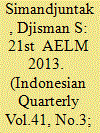

|
|
|
|
|
| Publication |
2013.
|
| Summary/Abstract |
Aspiring to serve the world as inclusive and sustainable growth is perhaps the most attractive of all the messages and intents that the 21st APEC Economic Leaders` Meeting (21st AELM) in Bali spread through its lengthy Bali Declaration. Given European Union`s incapacitation in the wake of austere policies made necessary by structural government deficits and other growth depressors, including aging, sizeable expansionary impulses that can pull the world economy out of descending trend in the short run can only come from APEC economies. Even through the united states (US) and to a lesser extent Japan are tightly social security expenditure, increase taxes and or sell assets in order to get back to a necessary fiscal balance, APEC can count on China, Southeast Asia, Republic of Korea (ROK) , and Russia as sources of stimulatory impacts on the world economy.
|
|
|
|
|
|
|
|
|
|
|
|
|
|
|
|
| 2 |
ID:
125273
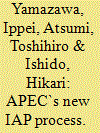

|
|
|
|
|
| Publication |
2013.
|
| Summary/Abstract |
In Order to fulfill the leaders` commitment 2010, all APEC economics have renews their IAP process under new guideline. An academic assessment of the efforts to achieve the Bogor goals in 2020 leads to the following question: How have they implemented in their IAPs the Bogor Goals progress report guideline adopted last year? How much have they achieved towards the Bogor Goals at the current stage? In which areas do they need to strengthen their implementation? This article seeks to objectively assess individual economics by individual area so that their remaining tasks will be clarified, although the mid-term assessment of 2010 adopted a group assessment of the thirteen economics, This paper makes an overall assessment and recommendations to the APEC SOM (Senior Office Meeting) regarding how to strengthen the new IAP process.
|
|
|
|
|
|
|
|
|
|
|
|
|
|
|
|
| 3 |
ID:
125347
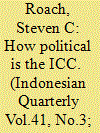

|
|
|
|
|
| Publication |
2013.
|
| Summary/Abstract |
The International Criminal Court faces many daunting political challenges in Kenya, Libya and Sudan. It has addressed these challenges and defended its impartiality in these situations by insisting that it remains an apolitical institution. This article challenges the conventional focus on the ICC`s apolitical nature by adopting an alternative approach that examines its political and pragmatic role in seeking mutual accommodation. It argues that the ICC can and should seek mutual accommodation rather than simply justice under the Rome Statute. In doing so, the article develops and applies the term diplomatic efficacy, or the political capacity of the ICC to produce acceptable solutions, by addressing the soft power dimension of such efficacy. The ICCS`s diplomatic efficacy not only reflects its special role as an independent court or agent in the interstate system, but also represents a practical and strategic to manage the political problems that its interventions and deferral to national authorities may create. The article concludes that the ICC`s political efficacy can help to resolve the incongruities between proactive complementarity and the provisions of cooperation encoded in the Rome Statute
|
|
|
|
|
|
|
|
|
|
|
|
|
|
|
|
| 4 |
ID:
125259


|
|
|
|
|
| Publication |
2013.
|
| Summary/Abstract |
Indonesia has evolved significantly since 1998, through the pace has been at times painfully slow. In addition to that, many have argued that Indonesia`s regional and global profile is rising. Since 2003, Indonesia has been the driving force behind political and security community building in the association of Southeast Asian Nation (ASEAN), even as it strengthens bilateral partnerships with major such as the United States, China and India. Indonesia has also been vigorously engaged in many global issues such as climate change and been a fervent of global institution including the G-20. Putting Indonesia in the discussion of regional power is important because it is one of Southeast Asia`s key leaders and is also an active participant in Asia`s emerging regional security architecture. This paper analyzes Indonesia`s emergence as a regional power by looking at both its recent domestic developments and its rising global and regional profile, and argues that albeit its international ambition and recent success in rising its diplomatic game, Indonesia still rest on shaky domestic foundations.
|
|
|
|
|
|
|
|
|
|
|
|
|
|
|
|
| 5 |
ID:
125251
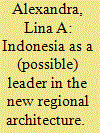

|
|
|
|
|
| Publication |
2013.
|
| Summary/Abstract |
In the past five year, discussions on the possibility for Indonesia to regain leadership have taken place both at the regional and international arena. As many leadership praised Indonesia for its relatively fast economic rebound and ability to maintain its annual economic growth around 65, its membership in the prestigious economic grouping G20, its settle internal conflicts (peace settlement with free Aceh Movement is an imminent example), as well as various initiatives to shaping the new regional architecture have been portrayed by many analysts and policymakers as indicators of Indonesia`s rising status as a middle power country. While the path towards becoming a middle power is naturally developed as a country`s economic, Military and political power increase, the notion of "leadership" needs additional factors. This paper seeks to analyze whether it is possible for Indonesia to become a leader in the region; or, at least, whether it has the potentials to lead. The first section examines how to Indonesian government expressed the idea of leadership. The third section focuses particularly on the level acceptance from different countries, both within the country as well as immediate and far neighboring countries should Indonesia wish to pursue its track to become leader in the region.
|
|
|
|
|
|
|
|
|
|
|
|
|
|
|
|
| 6 |
ID:
125320
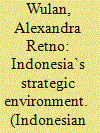

|
|
|
|
|
| Publication |
2013.
|
| Summary/Abstract |
Dynamic of international relations in the third quarter of 2013 showcase two traditional patterns between competition and cooperation. This article depicts several events within the scope of international relations during the period of June-September 2013. Such event evidently illustrate Indonesia`s Strategic environment, in the regional and international level, still corresponds to the patterns of competition which can lead to conflict, and patterns of cooperation that can build peace.
|
|
|
|
|
|
|
|
|
|
|
|
|
|
|
|
| 7 |
ID:
125312
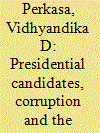

|
|
|
|
|
| Publication |
2013.
|
| Summary/Abstract |
The Dynamic of Indonesian politics have intensified in the anticipation of the largest dance of democracy on 2014: the legislative and presidential elections. The public` entertained' by how boisterous the big political parties are in announcing their presidential candidate ; such as Partai Golongan Karya/ Golkar with Aburizal Bakrie, Great Indonesia Movement Party (Partai Gerakan Inonesia Raya/ Gerindra) with Prabowo Subianto, People`s Conscience Party (Partai Hati Nurani Rakyat/ Hanura) with Wiranto, National Mandate Party (Partai Amanat Nasional/ PAN) with Hatta Rajasa, and United development Party (Partai Persatuan Pembangunan/ PPP) With Suryadharma Ali.
|
|
|
|
|
|
|
|
|
|
|
|
|
|
|
|
| 8 |
ID:
125279


|
|
|
|
|
| Publication |
2013.
|
| Summary/Abstract |
The Western intellectual hegemony in the educational domain in Indonesia has been very obvious, especially in the establishment of the controversial international pilot project schools and school with international standard in Indonesia. This provides clear evidence that the hegemonic power of the colonizers at work, as it has been allowed to seep in to the country`s education system. This seeks to show that the Indonesian government`s efforts to internationalize the national education system cannot be separated from what is often referred to as the "discourse of globalization", manifested (in this case) primary through the fetish of English language education. It examines the current educational practice in Indonesia, which is situated in this discourse of globalization in the light of a post-colonial perspective. It also seeks to unravel the Western intellectual determinism formulated in the policy regarding the goal of SBI, which has sparked protracted debates among scholars and educational practitioners.
|
|
|
|
|
|
|
|
|
|
|
|
|
|
|
|
| 9 |
ID:
125330
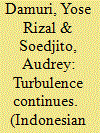

|
|
|
|
|
| Publication |
2013.
|
| Summary/Abstract |
Indonesia`s economic growth continues to decelerate. It declined to 6.03% in the first quarter from the previous quarter, and reached a lower level of 5081% in the second quarter. This decline in economic activity is due to the slowdown of growth in various aspects of both production and the demand side of the economy.
In addition to the economic slowdown, the second quarter of 2013 shows deterioration in Indonesia`s balance of payment. The current account deficit is increasingly widened due to the decline in exports and increase in imports. Indonesia`s balance of trade also shows trade deficit and deterioration trend in its performance.
|
|
|
|
|
|
|
|
|
|
|
|
|
|
|
|
|
|
|
|
|